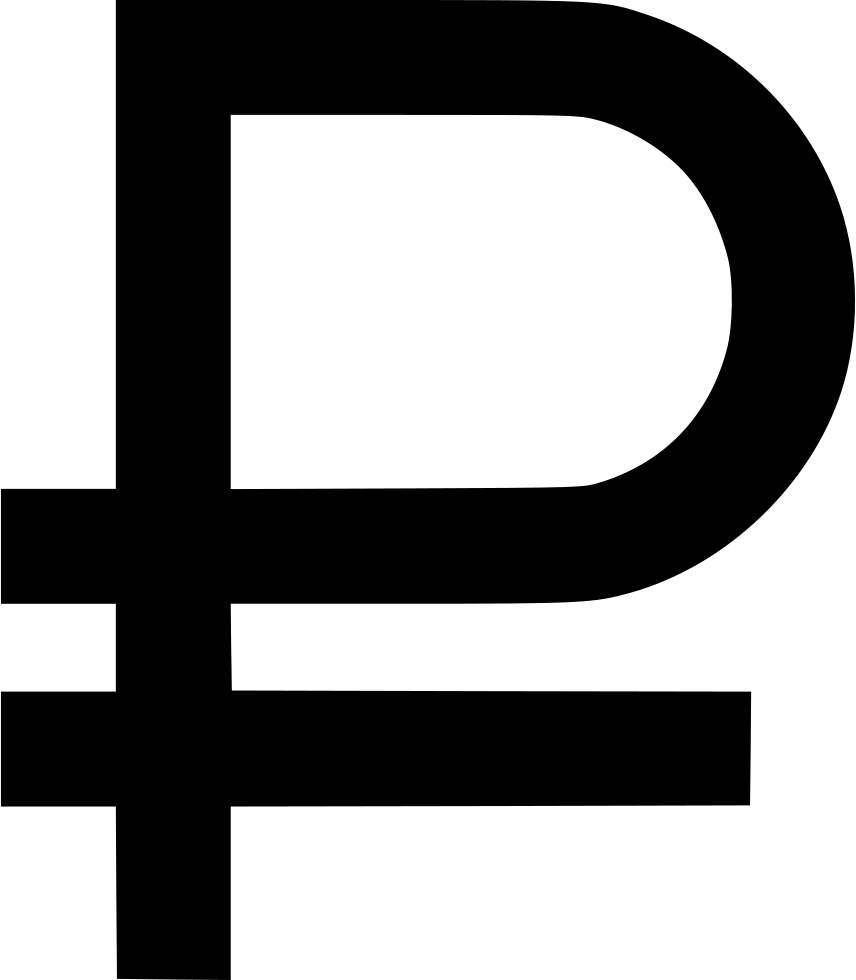
This image has format transparent PNG with resolution 856x980.
You can download this image in best resolution from this page and use it for design and web design.
Russian ruble PNG with transparent background you can download for free, just click on download button.
The Russian ruble or rouble (Russian: рубль rublʹ; sign: ₽, руб; code: RUB) is the currency of the Russian Federation, the two partially recognised republics of Abkhazia and South Ossetia and the two unrecognised republics of Donetsk and Luhansk. The ruble is subdivided into 100 kopeks (sometimes written as kopecks or copecks; Russian: копе́йка kopeyka, plural: копе́йки kopeyki).
The ruble was the currency of the Russian Empire and of the Soviet Union (as the Soviet ruble). However, today only Russia, Belarus and Transnistria use currencies with the same name. The ruble was the first currency in Europe to be decimalised, in 1704, when the ruble became equal to 100 kopeks.
In 1992 the Soviet ruble (code: SUR) was replaced with the Russian ruble (code: RUR) at the rate 1 SUR = 1 RUR. In 1998 preceding the financial crisis, the Russian ruble was redenominated with the new code "RUB" and was exchanged at the rate of 1,000 RUR = 1 RUB.
The ruble has been used in the Russian territories since the 14th century. The modern Russian ruble was created in December 1991 and used in parallel with the Soviet ruble, which remained in circulation until September 1993. All Soviet coins issued between 1961 and 1991, as well as 1-, 2- and 3-kopek coins, issued before 1961, formally remained legal tender until 31 December 1998, and in 1999–2001 they were exchanged for Russian rubles at the ratio of 1000:1.
Following the breakup of the Soviet Union in 1991, the Soviet ruble remained the currency of the Russian Federation until 1992. A new set of coins was issued in 1992 and a new set of banknotes was issued in the name of Bank of Russia in 1993. The Russian ruble with the ISO 4217 code RUR and number 810 replaced the Soviet ruble at the rate 1 SUR = 1 RUR.
After the fall of the Soviet Union, the Russian Federation introduced new coins in 1992 in denominations of 1, 5, 10, 20, 50 and 100 rubles. The coins depict the double-headed eagle without a crown, sceptre and globus cruciger above the legend "Банк России" ("Bank of Russia"). It is exactly the same eagle that the artist Ivan Bilibin painted after the February Revolution as the coat of arms for the Russian Republic. The 1- and 5-ruble coins were minted in brass-clad steel, the 10- and 20-ruble coins in cupro-nickel, and the 50- and 100-ruble coins were bimetallic (aluminium-bronze and cupro-nickel-zinc). In 1993, aluminium-bronze 50-ruble coins and cupro-nickel-zinc 100-ruble coins were issued, and the material of 10- and 20-ruble coins was changed to nickel-plated steel. In 1995 the material of 50-ruble coins was changed to brass-plated steel, but the coins were minted with the old date 1993. As high inflation persisted, the lowest denominations disappeared from circulation and the other denominations became rarely used.
During this period the commemorative one-ruble coin was regularly issued. It is practically identical in size and weight to a 5-Swiss franc coin (worth approx. €4.39 / US$5.09 as of August 2018). For this reason, there have been several instances of (now worthless) ruble coins being used on a large scale to defraud automated vending machines in Switzerland.
All Russian ruble banknotes are currently printed at the state-owned factory Goznak in Moscow, which was founded on 6 June 1919 and operated ever since. Coins are minted in Moscow and at the Saint Petersburg Mint, which has been operating since 1724.
In this clipart you can download free PNG images: Russian ruble PNG images free download